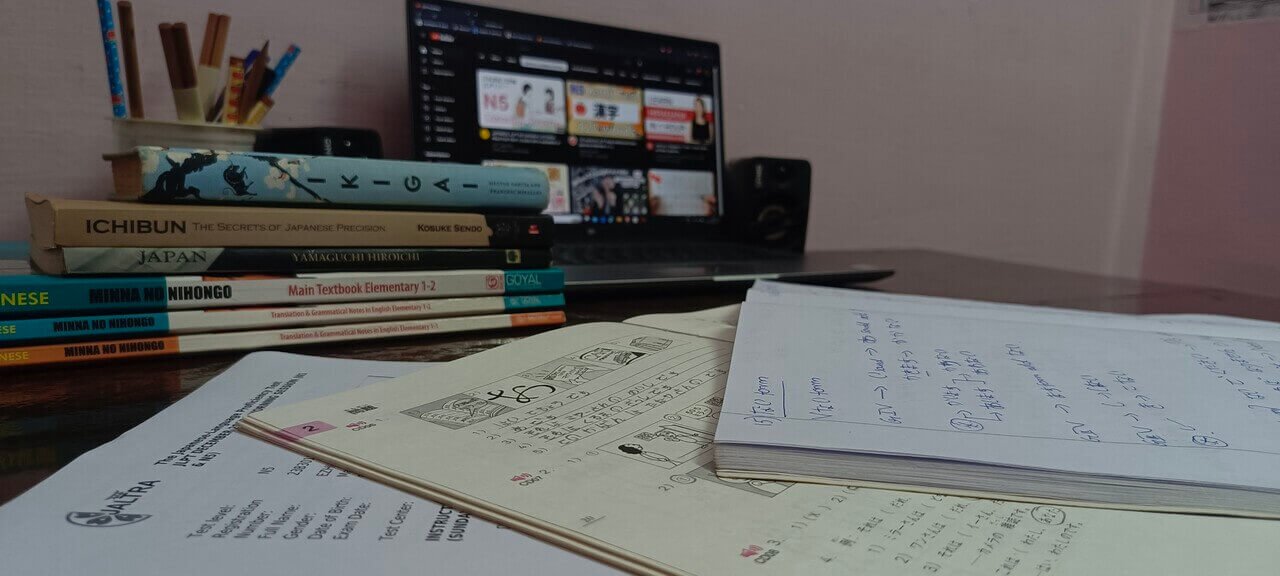
If you’re stepping into the world of Japanese language learning, the JLPT N5 level is the perfect place to begin. As the first and most basic level of the Japanese Language Proficiency Test (JLPT), the N5 focuses on fundamental grammar, vocabulary, and kanji, making it ideal for absolute beginners. But even though it's an introductory level, a structured study plan, the right resources, and focused revision are essential to succeed. In this guide, we’ll share practical tips to prepare for JLPT N5 effectively—so whether you’re a self-learner or following a course, you can walk into the exam with confidence.
Before diving into preparation, it’s essential to understand what JLPT N5 tests. The exam evaluates your ability to understand some basic Japanese, mainly learned in beginner classes.
JLPT N5 doesn’t require fluency but does demand a consistent study routine and familiarity with core concepts. If you're wondering how to study for JLPT N5, start by building a structured study plan that includes vocabulary, listening, and grammar practice.
Explore the Best Places to Learn Japanese in Delhi for expert training, immersive learning, and top-rated language programs.

Before diving into the preparation, it's crucial to gather the right resources. Use beginner-friendly textbooks like Minna no Nihongo, and download free JLPT N5 study material PDFs for vocabulary and grammar. These materials provide a strong foundation for the exam structure and content. A reliable study guide sets the tone for consistent progress.
Use beginner-friendly textbooks like Genki I, Minna no Nihongo I, or Japanese for Busy People. You can also download JLPT N5 study guide PDFs from platforms like JLPT Sensei and Nihongo-Pro for structured learning.
Print or download vocabulary lists and kanji sheets. Use flashcard apps like Anki or Quizlet with spaced repetition systems (SRS) to reinforce memory.
Try JLPT N5 practice tests from official websites or apps.
For listening, platforms like JapanesePod101, NHK News Easy, and JLPT N5 listening YouTube channels are goldmines and Scoring well in these areas not only improves your skills but also boosts your chances of earning the Japanese N5 certificate with confidence.
If you're aiming for the intermediate level of Japanese, don’t miss our in-depth guide on tips and tricks to prepare for JLPT N3 level for smart strategies and practice routines.
When it comes to smart preparation, following strategic steps can save time and boost results. Focus on learning kana thoroughly, understand sentence patterns, and reinforce grammar daily. These tips to prepare for JLPT N5 will help you structure your learning in a way that aligns with the test format and improves your overall language retention. Make sure you're also familiar with the JLPT N5 exam pattern, so you can tailor your study methods to the actual structure of the test and manage your time effectively.
Before touching kanji or grammar, master the two phonetic alphabets. They are foundational for reading any Japanese text.
Break your JLPT N5 preparation into phases:
Rather than rote memorization, understand how grammar works within sentences. Use Tae Kim’s Grammar Guide or online resources like Bunpro to structure your grammar learning.
JLPT has a dedicated listening section. Don’t skip this!
Beginners stepping up from N5 will benefit from these effective tips to prepare for JLPT N4 which cover vocabulary, grammar, and time management.
Simulate the real JLPT test at least once a week in the final month.

Make use of apps like Anki, Lingo Deer, and JLPT Sensei to practice on the go. Online flashcards and quizzes are great for revision. Also, engage with Reddit communities or Facebook study groups for shared resources and motivation. These platforms can provide extra tips to prepare for JLPT N5 from those who’ve successfully passed.
Online learning has made JLPT N5 prep more accessible than ever.
Tips to Prepare for JLPT N5 PDF Resources
Websites like Nihongo-Pro, JLPT Sensei, and Reddit offer downloadable study planners, worksheets, and guides.
Tips to Prepare for JLPT N5 Reddit Community
Reddit threads on r/LearnJapanese are full of advice, study schedules, success stories, and downloadable materials.
Useful Apps
Many beginners rush into Kanji or memorize vocabulary without context. Avoid cramming without comprehension. Skipping listening practice is another common pitfall. These habits can hinder your performance, so reviewing common errors and implementing better tips to prepare for JLPT N5 can keep your study plan efficient and exam-focused.
Just starting out? Here’s a complete breakdown on how to learn Japanese step-by-step, ideal for beginners exploring the language for the first time.
In the last week, focus on full-length mock tests, review weak areas, and sharpen listening skills. Avoid learning anything completely new—this is the time to consolidate and revise. With a calm mind and consistent review, applying the right tips to prepare for JLPT N5 during this period can dramatically boost your final score.
1. How long does it take to prepare for JLPT N5?
With consistent study (1–2 hours a day), you can prepare in 2 to 3 months. Absolute beginners may need 4–5 months for a strong foundation.
2. How to start studying for N5?
Start with mastering Hiragana and Katakana, then move to beginner grammar and vocabulary. Use books like Genki I and online resources for structured guidance.
3. Is JLPT N5 easy to pass?
JLPT N5 is beginner-friendly but requires focused preparation. With daily study and practice tests, it’s definitely achievable.
4. Can I self-study for JLPT N5?
Yes! Many learners clear N5 through self-study using PDFs, apps, YouTube lessons, and mock tests. A structured plan and discipline are essential.
5. What is the price of the JLPT N5 test?
In India, the registration fee for JLPT N5 usually ranges from ₹1000 to ₹1500, depending on the test center and city.
Preparing for JLPT N5 can be a rewarding first step into the Japanese language. With structured learning, focused practice, and the right tools, even self-learners can clear the exam confidently. Remember, consistency beats intensity—study a little each day, revise strategically, and use all available digital resources. These practical tips to prepare for JLPT N5 will help you build a solid base and open doors to higher levels of fluency.
Your Japanese language journey starts here—頑張ってください (ganbatte kudasai) and good luck on your N5!